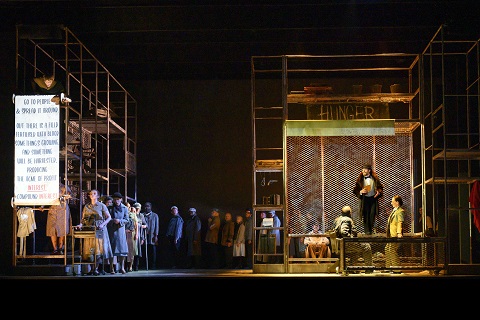
08 Oct 2019
ETO's The Silver Lake at the Hackney Empire
‘If the present is already lost, then I want to save the future.’
English Touring Opera are delighted to announce a season of lyric monodramas to tour nationally from October to December. The season features music for solo singer and piano by Argento, Britten, Tippett and Shostakovich with a bold and inventive approach to making opera during social distancing.
This tenth of ten Live from London concerts was in fact a recorded live performance from California. It was no less enjoyable for that, and it was also uplifting to learn that this wasn’t in fact the ‘last’ LfL event that we will be able to enjoy, courtesy of VOCES8 and their fellow vocal ensembles (more below …).
Ever since Wigmore Hall announced their superb series of autumn concerts, all streamed live and available free of charge, I’d been looking forward to this song recital by Ian Bostridge and Imogen Cooper.
The Sixteen continues its exploration of Henry Purcell’s Welcome Songs for Charles II. As with Robert King’s pioneering Purcell series begun over thirty years ago for Hyperion, Harry Christophers is recording two Welcome Songs per disc.
Although Stile Antico’s programme article for their Live from London recital introduced their selection from the many treasures of the English Renaissance in the context of the theological debates and upheavals of the Tudor and Elizabethan years, their performance was more evocative of private chamber music than of public liturgy.
In February this year, Albanian soprano Ermonela Jaho made a highly lauded debut recital at Wigmore Hall - a concert which both celebrated Opera Rara’s 50th anniversary and honoured the career of the Italian soprano Rosina Storchio (1872-1945), the star of verismo who created the title roles in Leoncavallo’s La bohème and Zazà, Mascagni’s Lodoletta and Puccini’s Madama Butterfly.
Evidently, face masks don’t stifle appreciative “Bravo!”s. And, reducing audience numbers doesn’t lower the volume of such acclamations. For, the audience at Wigmore Hall gave soprano Elizabeth Llewellyn and pianist Simon Lepper a greatly deserved warm reception and hearty response following this lunchtime recital of late-Romantic song.
Collapsology. Or, perhaps we should use the French word ‘Collapsologie’ because this is a transdisciplinary idea pretty much advocated by a series of French theorists - and apparently, mostly French theorists. It in essence focuses on the imminent collapse of modern society and all its layers - a series of escalating crises on a global scale: environmental, economic, geopolitical, governmental; the list is extensive.
For this week’s Live from London vocal recital we moved from the home of VOCES8, St Anne and St Agnes in the City of London, to Kings Place, where The Sixteen - who have been associate artists at the venue for some time - presented a programme of music and words bound together by the theme of ‘reflection’.
'Such is your divine Disposation that both you excellently understand, and royally entertaine the Exercise of Musicke.’
Amongst an avalanche of new Mahler recordings appearing at the moment (Das Lied von der Erde seems to be the most favoured, with three) this 1991 Mahler Second from the 2nd Kassel MahlerFest is one of the more interesting releases.
‘And there was war in heaven: Michael and his angels fought against the dragon; and the dragon fought and his angels, And prevailed not; neither was their place found any more in heaven … that old serpent … Satan, which deceiveth the whole world: he was cast out into the earth, and his angels were cast out with him.’
If there is one myth, it seems believed by some people today, that probably needs shattering it is that post-war recordings or performances of Wagner operas were always of exceptional quality. This 1949 Hamburg Tristan und Isolde is one of those recordings - though quite who is to blame for its many problems takes quite some unearthing.
There was never any doubt that the fifth of the twelve Met Stars Live in Concert broadcasts was going to be a palpably intense and vivid event, as well as a musically stunning and theatrically enervating experience.
‘Love’ was the theme for this Live from London performance by Apollo5. Given the complexity and diversity of that human emotion, and Apollo5’s reputation for versatility and diverse repertoire, ranging from Renaissance choral music to jazz, from contemporary classical works to popular song, it was no surprise that their programme spanned 500 years and several musical styles.
The Academy of St Martin in the Fields have titled their autumn series of eight concerts - which are taking place at 5pm and 7.30pm on two Saturdays each month at their home venue in Trafalgar Square, and being filmed for streaming the following Thursday - ‘re:connect’.
The London Symphony Orchestra opened their Autumn 2020 season with a homage to Oliver Knussen, who died at the age of 66 in July 2018. The programme traced a national musical lineage through the twentieth century, from Britten to Knussen, on to Mark-Anthony Turnage, and entwining the LSO and Rattle too.
With the Live from London digital vocal festival entering the second half of the series, the festival’s host, VOCES8, returned to their home at St Annes and St Agnes in the City of London to present a sequence of ‘Choral Dances’ - vocal music inspired by dance, embracing diverse genres from the Renaissance madrigal to swing jazz.
Just a few unison string wriggles from the opening of Mozart’s overture to Le nozze di Figaro are enough to make any opera-lover perch on the edge of their seat, in excited anticipation of the drama in music to come, so there could be no other curtain-raiser for this Gala Concert at the Royal Opera House, the latest instalment from ‘their House’ to ‘our houses’.
"Before the ending of the day, creator of all things, we pray that, with your accustomed mercy, you may watch over us."

‘If the present is already lost, then I want to save the future.’
Given the social and ideological context of our own present, the words of the German dramatist Georg Kaiser, written at the end of World War 1, might serve as both a dispiriting reminder and uplifting inspiration.
Certainly, it’s not difficult to see why English Touring Opera’s Artistic Director, James Conway, thought that Kaiser’s third and final collaboration with Kurt Weill, Der Silbersee (The Silver Lake), would resonate with audiences when the company take it on tour around the UK, alongside another that other sui generis ‘singspiel’, Mozart’s The Seraglio .
For while Der Silbersee is both informed by and a critique of its immediate context, it combines contemporary political allegory on the condition of Germany in the dying days of the Weimar Republic - it was premiered on 18th February 1933, less than a month after Hitler had become Chancellor of Germany - with utopian symbolism that enables it to transcend that context. Der Silbersee thus both addresses the condition of a historical present and articulates Kaiser’s ambition of saving the future, through social solidarity and reparation for injustice; and, the power and relevance of its promise of a better world will surely never cease.
That said, the contemporary reception of Der Silbersee suggests that its utopianism can’t easily be ‘disassociated’ from its specific historical moment. Following the Magdeburg premiere there were complaints from community organisations about ‘the degradation of art to the one-sided, un-German propaganda of Bolshevist theories … This play preaches the idea of class hate and contains innumerable open and veiled invitations to violence,’ while the Nazi newspaper Leipziger Tageszeitung sneered: ‘Kaiser, though not himself a Jew, belongs to the circle of Berlin literary Hebrews. His latest clumsy piece of staged junk is called Der Silbersee and has ‘music’ by Weill.’
Later, the writer Hans Rothe recalled the Leipzig premiere: ‘Everyone who counted in the German Theater met together for the last time. And everyone knew this. The atmosphere there can hardly be described. It was the last day of the greatest decade of German culture in the twentieth century. The Nazis’ barracking and yelling were somewhat disturbing.’ Indeed, the simultaneous productions in Leipzig, Erfurt, and Magdeburg were suspended, Weill departed shortly afterwards for the US, and there were no public performances of Weill’s music until the war had ended.
The challenge that Conway must rise to, then, is to respect Der Silbersee’s explicit refutation of the prevailing political trend of its time, while also communicating the ongoing relevance of its promise and embodiment of social transformation. We must understand the explicit darkness which Der Silbersee satirises and challenges, and also connect such shadows with those that darken our own disturbing days. It’s no easy task, and Conway is, I feel, only partially successful - but that’s in no way to diminish the dynamism and conviction of his production.
The work’s full title is Der Silbersee: Ein Wintermärchen , ‘a winter’s fairytale’ alluding both to Shakespeare and, significantly for its German audience, to Heinrich Heine’s 1844 satirical poem. Deutschland: Ein Wintermarchen. And, the action truly takes place in a ‘winter of discontent’: Kaiser’s libretto is peopled by the hungry dispossessed and rapacious capitalists whose policy of over-supply keeps prices high. Food banks and Lehman Brothers, anyone?
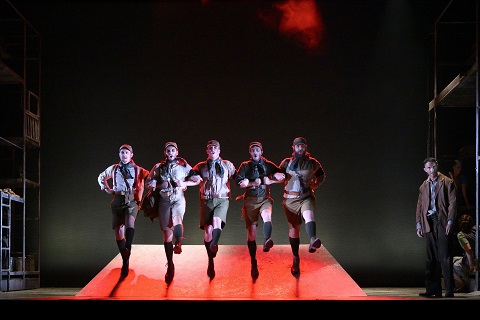 ETO Ensemble.
ETO Ensemble.
The action begins with Severin and his unemployed, starving comrades symbolically assuaging their hunger by burying a life-size doll. When they raid a grocery store, Severin is shot by Olim, a policeman, who, discovering that his victim has stolen only a pineapple - a token of aspiration rather the sustenance he needs - feels remorse and determines to make recompense by falsifying his report and resigning from duty. When he wins the Lottery, Olim buys a castle (a symbol of the Weimar state), installs Frau von Luber (a representative of the old Wilhelmine order) as housekeeper and devotes himself to serving as Severin’s anonymous benefactor. The latter, confined to a wheelchair, rages with vengeance towards his assailant. The intrigued Frau von Luber engages her penniless, guileless niece Fennimore to spy on Olim and Severin, and discovering Olim’s secret she blackmails him into signing away control of his property to her. Olim and Severin are expelled from the republic, in a winter snowstorm, and head towards the silver lake where they risk drowning in suicidal despair. However, Fennimore, who has brought about a reconciliation between the two men, explains that ‘whoever must continue will be carried by the Silver Lake’. Though it is spring, the lake has frozen over, and Olim and Severin are able to escape to a new world.
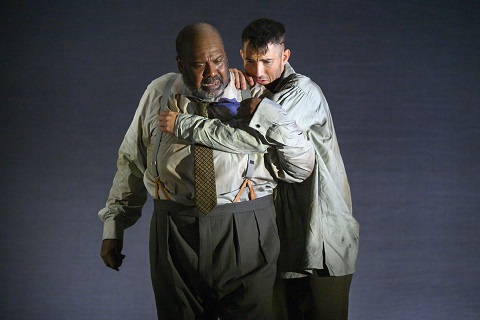 Ronald Samm (Olim); David Webb (Severin).
Ronald Samm (Olim); David Webb (Severin).
One of the challenges is how to deal with Kaiser’s lengthy text. When Der Silbersee was performed at the Wexford Opera Festival in 2007, director Keith Warner used Rory Bremner’s English translation of the complete text, but several critics found the ratio of spoken words and song unbalanced and in favour of the former. Except for the choral items which are sung in English, Conway and conductor James Holmes retain the original German for the sung numbers - a sensible decision as it foregrounds the historical particular - and have written a new, abbreviated English text for the narration, which is spoken by Bernadette Iglich. However, Conway throws the emphasis back on the ‘play’ at the expense of the ‘song’, by rejecting conventional surtitles in favour of Brechtian placards and banners, scrolls and even tickertape, upon which translations of the lyrics are stamped and scribbled. The problem is that as our eyes cast around Adam Wiltshire’s folding-scaffold set, searching in the gloom for the next cue, where the words are becomes more of a preoccupation than what they are saying.
This is particularly detrimental to the impact of the Chorus, whose interjections - as Brecht would have intended - are designed to both influence and articulate our own views: as when, for example, the Chorus persuade Olim to resist the allure of the Lottery Agent’s promise of compound interest in favour of altruistic investment in the common good. However, as Shop-girls, Grave-diggers and disaffected Youths, the Ensemble and Streetwise Opera make a strong-voiced chorus and deliver Bernadette Iglich’s choreography with vitality, complemented by Holmes’ slick direction of the instrumentalists, though the latter’s tone might have had a little more grit and grain.
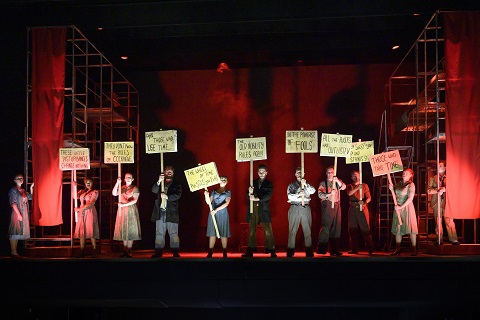 ETO Ensemble.
ETO Ensemble.
Kaiser’s drama is driven by the transformation of the characters’ motivations, but it might be argued that in defining his protagonists the librettist relies less on psychological realism than on the emblematic depiction of social developments. Indeed, the Austrian director and actor Heinrich Schnitzler complained that Kaiser’s characters ‘often suddenly cease to be characters and only speak with Georg Kaiser’s mouth and brain about abstract philosophical and sociological matters’.
The ETO cast do, however, succeed in communicating credible feelings and motives. David Webb made Severin’s anger palpable and his singing was taut, while Ronald Samm’s Olim was appropriately reflective, his baritone languid at times but always gracefully solemn. Clarissa Meek avoided the temptation to turn Frau von Luber into a pantomime wicked witch; James Kryshak was a slick Lottery Agent and, as Baron Laur, joined the castle-commanding Frau in a deliciously wry duet celebrating the restoration of the old order - pointedly named ‘Schlaraffenland’, the fool’s paradise. Rising above all - quite literally at the close when she delivered her aria of reconciliation - was Luci Briginshaw’s Fennimore, whose sweet, light soprano perfectly captured the dream of liberation.
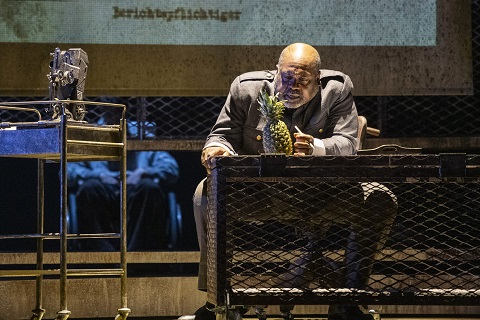 Ronald Samm (Olim).
Ronald Samm (Olim).
Historically, as we know with hindsight, Kaiser’s utopia remains just that, even though his play ends with a ‘miracle’. And, so the ending poses further challenges, for while Der Silbersee is a social commentary it is also a fantasy, and a production must create a gradual transition from realism to symbolism. In this way, Der Silbersee is closer to Die Zauberflöte than to Die Entführung aus dem Serail. Conway’s solution is to drape his cast and chorus in silver-foil cloaks, but this does not really effect a mediation between life and dreams, such as Shakespeare achieves in A Winter’s Tale, when Paulina summons the ‘statue’ of Hermione to life: ‘ Music, awake her; strike!/ ‘Tis time; descend; be stone no more; approach;/ Strike all that look upon with marvel.’
Kaiser prophesied: ‘The music to Der Silbersee is something immortal, because art lives longer than all politics.’ Can we, today, believe in Der Silbersee’s concluding promise of escape and redemption? That, through the intervention of fate and the wheel of fortune, the hours of night will give way to the dawning of the light? Does our present foretell of future catastrophe, or can the social collectivism which Kaiser and Weill espouse ‘save’ us? I’m not sure that Conway makes us ask, or answer, this question, but if a production of Der Silbersee is to transcend its specificity then surely it must?
I suspect, however, that Der Silbersee has irreconcilable feet in both past and present; moreover, present-day German audiences surely respond differently to its historical particulars, in ways not accessible to Anglophone audiences. That said, audiences around the UK should be grateful to Conway and ETO for the opportunity to reflect on such matters. Can we transform ourselves and our world? Does the future offer hope?
Claire Seymour
Kurt Weill: The Silver Lake (Der Silbersee)
Olim - Ronald Samm, Severin - David Webb, Fennimore - Luci Briginshaw, Frau Luber - Clarissa Meek, Baron Laur/Lottery Agent - James Kryshak, Shopgirl 1 - Abigail Kelly, Shopgirl 2 - Hollie-Anne Bangham, Gravedigger 1 - David Horton, Gravedigger 2 - Andrew Tipple, Youth 1 - Jan Capinski, Youth 2 - Bradley Travis, Ensemble (Rosanna Harris, Amanda Wagg, Maciek O’Shea), Narrator - Bernadette Iglich, Streetwise Opera; Director - James Conway, Conductor - James Holmes, Designer - Adam Wiltshire, Lighting Designer - David W Kidd, Orchestra of ETO.
Hackney Empire, London; Saturday 5th October 2019.